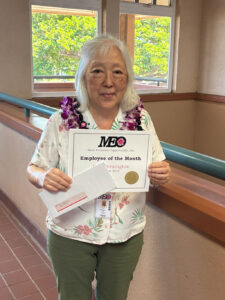Group sues Kamehameha Schools over admission policy favoring Native Hawaiians
A new lawsuit in the U.S. District Court in Honolulu seeks to overturn Kamehameha Schools’ admissions policy that gives preference to Native Hawaiians.
The suit filed by Students for Fair Admissions — a leading opponent of affirmation action in the U.S. — seeks to stop Kamehameha Schools from favoring Native Hawaiians when deciding who gets to attend the prestigious private school system with dozens of preschools and three K-12 school campuses on Oahu, Hawaii Island and Maui.
The lawsuit is part of a larger effort to expand the legal definition of racial discrimination in education after a Supreme Court ruling struck down affirmative action in college admissions in June 2023.
The lawsuit against Kamehameha Schools was somewhat expected after the Students for Fair Admissions group set up a website earlier this year posing the question: “Is your child barred from Kamehameha Schools based on ancestry?”
The lawsuit doesn’t include any named or anonymous plaintiffs other than Students for Fair Admissions, but the complaint says the group has members who are “injured by Kamehameha’s discrimination,” and who are “ready and able” to apply to Kamehameha Schools.
On Monday, the Kamehameha Schools Board of Trustees released a statement saying the board is ready to vigorously defend its admission policy, as it has successfully done in the past.
“The facts and the law are on our side, and we are confident that we will prevail,” the statement reads. “We will stand strong together.”
For many of the schools’ alumni and parents of current students, being admitted to Kamehameha Schools is highly desirable because it’s affordable, offers stellar academics and is grounded in the culture of Hawaii’s Indigenous people.
Kamehameha Schools
Kamehameha Schools was founded by Princess Bernice Pauahi Bishop, the great-granddaughter of King Kamehameha I.
On Oct. 31, 1883, Bishop signed her last will and testament. In it, she gave “all of the rest, residue, and remainder of (her) estate real … to erect and maintain in the Hawaiian Islands two schools, each for boarding and day scholars, one for boys and one for girls, to be known as and called the Kamehameha Schools.”
According to Kamehameha Schools, Pauahi Bishop bequeathed approximately 353,000 acres of land from Princess Ruth Ke’elikōlani, including parcels from Ke’elikōlani’s father Mataio Kekūanāo’a, brother Lot Kapuāiwa (Kamehameha V), brother Moses Kekūāiwa, sister Victoria Kamāmalu, and hānai son William Pitt Leleiōhoku.
Now, Kamehameha Schools is the largest private landowner in Hawaii with an endowment that is worth more than $15 billion, and the private school system doesn’t rely on any federal or state dollars.
Students for Fair Admissions
According to Students for Fair Admissions, its group is a nonprofit group with a membership of more than 20,000 students, parents and others who believe that racial classifications and preferences in college admissions are unfair, unnecessary and unconstitutional.
“Our mission is to support and participate in litigation that will restore the original principles of our nation’s civil rights movement: A student’s race and ethnicity should not be factors that either harm or help that student to gain admission to a competitive university,” according to the group’s website.
Students for Fair Admissions was founded by Edward Blum, a fellow at the conservative think tank American Enterprise Institute. The group is based out of Arlington, Virginia.
Challenging admissions
According to the lawsuit, acceptance to Kamehameha Schools is highly competitive and the number of applications exceeds available slots by as much as 17 to 1, depending on the campus and grade.
The lawsuit says there’s an understanding among Hawaii residents that only students with Native Hawaiian blood will be admitted to Kamehameha Schools.
In the suit, Students for Fair Admissions claims that Kamehameha Schools’ policy of giving preference to Native Hawaiians functions as a racial bar that all but guarantees applicants without Native Hawaiian ancestry will be denied admission.
The lawsuit says Kamehameha Schools gives preference to Native Hawaiian applicants first while striving to ensure there are never any leftover seats for potential students without Native Hawaiian ancestry.
The lawsuit says that if not for the admissions policy, there are non-Hawaiian families who would apply for reasons including bad experiences with local public schools, Kamehameha’s high-quality programs and for its networking and career opportunities.
“Nothing about training future leaders, or preserving Hawaii’s unique culture, requires Kamehameha to block its students from learning beside children of different ancestries — Asian, black, Hispanic, or white,” the lawsuit reads.
Difference of opinion
“The comment shows the group behind the lawsuit doesn’t understand what it means to be Hawaiian or multiracial,” said state Sen. Jarrett Keohokalole, who is running for Congress.
Like Keohokalole, many people are defending Kamehameha Schools’ admission policy, which they see as a way to remedy disparities stemming from U.S. colonization and the 1893 overthrow of the Hawaiian Kingdom by a group of American business owners.
Keohokalole noted that his mother is a white woman from Medford, Oregon, making him Scottish, German, French, Tahitian and Hawaiian.
The challenge to Kamehameha Schools is coming from “tone deaf outsiders who know nothing about Hawaii,” said Keohokalole, who applied for Kamehameha Schools in 1995 for seventh grade, and two years later for high school, but was rejected and graduated from a Catholic boys school.
Because admission to Kamehameha Schools involves application agreements, enrollment contracts and tuition obligations, the complaint alleges race-based discrimination in contracting.
The lawsuit also argues that Kamehameha Schools can preserve and strengthen its Hawaiian-language and culture-based curriculum while adopting race-neutral admissions criteria.
“Kamehameha can keep its mission, its culture, and its curriculum but it cannot bar children because of their race,” Blum said in a statement. “Native Hawaiian culture can be celebrated without imposing ancestry-based barriers that exclude white, black, Hispanic and Asian children.”
A legal victory
If Students for Fair Admissions is successful against Kamehameha Schools, it wouldn’t be the first admissions policy the group has taken down.
The group previously challenged admissions policies at Harvard and the University of North Carolina, the nation’s oldest private and public colleges, respectively. In June 2023, the U.S. Supreme Court ruled 6-3 in favor of Students for Fair Admissions that colleges and universities must stop considering race in admissions.
Chief Justice John Roberts said that for too long universities have “concluded, wrongly, that the touchstone of an individual’s identity is not challenges bested, skills built, or lessons learned but the color of their skin. Our constitutional history does not tolerate that choice.”
The Supreme Court had twice upheld race-conscious college admissions programs in the past 20 years, including as recently as 2016. But that was before the three appointees of President Donald Trump joined the court.
In the dissenting opinion, Justice Sonia Sotomayor wrote the decision “rolls back decades of precedent and momentous progress.” In a separate dissent, Justice Ketanji Brown Jackson called the decision “truly a tragedy for us all.”
Support in the House
Leaders of the Hawaii House of Representatives issued a statement saying the body supports Kamehameha Schools.
“As the legal process continues, the House reaffirms its respect for Princess Bernice Pauahi Bishop’s vision, the integrity of her legacy, and Hawaii’s constitutional commitment to Native Hawaiian education,” the statement reads.
House leaders said Kamehameha Schools’ enduring work to cultivate leadership rooted in aloha ʻāina, advance Hawaiian language and culture, and strengthen community stewardship aligns closely with the state’s efforts to ensure that every child in Hawaii has the opportunity to succeed.
“We stand in support of Kamehameha Schools’ mission and its unwavering commitment to the Native Hawaiian people,” the leaders said. “When Hawaii’s Indigenous community thrives, all of Hawaii thrives.”
The Associated Press contributed to this report.


